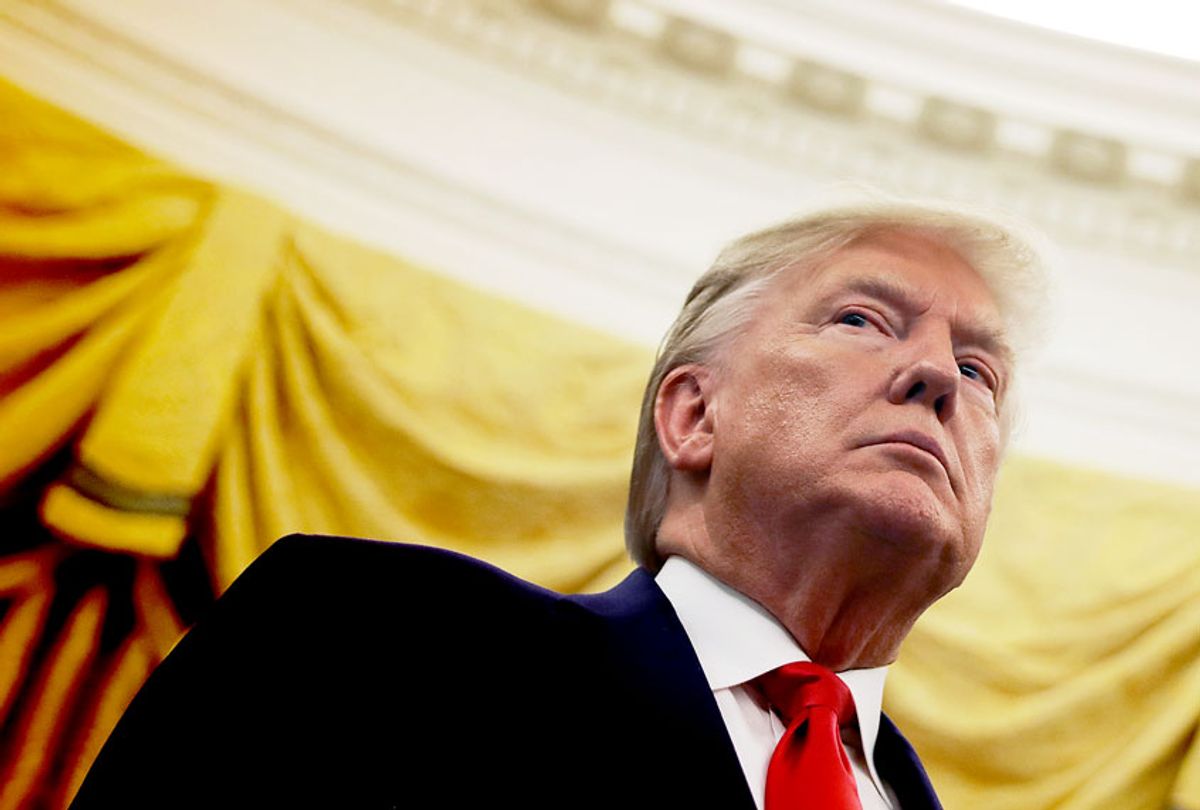President Donald Trump shared an article naming the alleged Ukraine whistleblower to his 68 million Twitter followers on Thursday.
Trump re-tweeted a post from his re-election campaign’s “War Room” linking to a Washington Examiner article, which includes the alleged whistleblower’s name in the headline.
“It's pretty simple. The CIA ‘whistleblower’ is not a real whistleblower!” the tweet said.
The name has circulated among conservative circles for months despite the whistleblower attorney’s warning that it puts him and his family at risk. Salon has not confirmed the identity of the whistleblower and is not publishing the name circulated by conservative outlets.
Trump’s retweet came despite pleas from his family and advisers against outing him, The Daily Beast reported. Ivanka Trump and White House counsel Pat Cipollone both explicitly asked the president not to publicize the name, which the administration has known since August, according to the report.
Trump has “gossiped for weeks” about the whistleblower, according to the report, and last month claimed to reporters that the whistleblower was “an Obama guy” who “hates Trump.”
The campaign tweet shared by Trump came in response to Mark Zaid, an attorney for the whistleblower, who criticized Sen. Marsha Blackburn, R-Tenn., for her comments about the his client.
Blackburn baselessly alleged in November that Lt. Col. Alexander Vindman, who remains the top Ukraine expert on the White House National Security Council, is the whistleblower’s “handler.”
Zaid called for Blackburn to be removed from the Senate Whistleblower Caucus over her “hostility” toward whistleblowers.
The whistleblower’s attorneys previously warned Trump of “legal action” in a “cease and desist” letter to the White House, asserting that the president and his allies put the whistleblower and his family in “physical danger.”
Numerous Trump allies have shared the name of the alleged whistleblower, who was identified in conservative outlets as a 33-year-old CIA analyst who worked on the National Security Council under former President Barack Obama. Those reports were shared with millions of followers by Donald Trump Jr. and Sen. Rand Paul, R-Ky.
Paul later stood alongside Trump at a rally and demanded that the media out the whistleblower, a call which Trump himself has also made.
Republicans repeatedly tried to get the name of the whistleblower on the record during closed-door depositions and public hearings in the House impeachment inquiry. Rep. Louie Gohmert, R-Texas, blurted out the name of the alleged whistleblower at a televised House Judiciary hearing — as well as a completely unrelated hearing on Puerto Rico.
Republicans have alleged that the purported whistleblower’s ties to the Obama administration suggest that his complaint, which triggered the impeachment probe, was motivated by bias. But the complaint was found credible by numerous top Trump appointees, who forwarded the complaint to the Department of Justice, which declined to follow up.
The complaint has since been corroborated by numerous Trump administration officials who testified to Congress. Trump has repeatedly claimed that the whistleblower was “partisan” and got his “perfect call” with Ukrainian President Volodymyr Zelensky “almost completely wrong.” Politifact rated this their "lie of the year".
“Despite what Trump claims, the whistleblower got the call ‘almost completely’ right,” the outlet reported. “We know this from the very record of the call the president released. We know this from testimony under oath from career diplomats and other officials. And the president and his allies have told reporters that Trump did what the whistleblower suggested — urged the Ukrainian president to investigate political rival Joe Biden.”
Outing the whistleblower could have serious legal ramifications, as well, which is why legal experts say most Republicans aside from Gohmert have avoided publicly outing the CIA officer.
"The most vocal Trump defenders in Congress have fallen into lockstep, excoriating Democrats for maintaining the whistleblower's anonymity while in almost every case carefully avoiding disclosure themselves,” prominent whistleblower attorneys Eric Havian and Michael Roenickher wrote in a USA Today op-ed. "The Intelligence Community Whistleblower Protection Act makes it unlawful to take any 'action constituting reprisal' against whistleblowers who follow the proper procedures to report national security concerns, as the whistleblower did here. The law is clear that 'outing' a whistleblower can indeed constitute retaliation and reprisal."



Shares